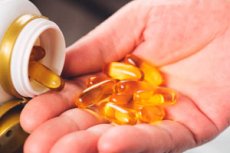Another Study Refutes the Benefit of Omega-3 Supplements for Dry Eye Syndrome
Sist anmeldt: 14.06.2024

Alt iLive-innhold blir gjennomgått med medisin eller faktisk kontrollert for å sikre så mye faktuell nøyaktighet som mulig.
Vi har strenge retningslinjer for innkjøp og kun kobling til anerkjente medieområder, akademiske forskningsinstitusjoner og, når det er mulig, medisinsk peer-evaluerte studier. Merk at tallene i parenteser ([1], [2], etc.) er klikkbare koblinger til disse studiene.
Hvis du føler at noe av innholdet vårt er unøyaktig, utdatert eller ellers tvilsomt, velg det og trykk Ctrl + Enter.

Re-esterified omega-3 fatty acid triglyceride supplements did not improve symptoms of dry eye syndrome associated with meibomian gland dysfunction, according to results of a randomized trial in South Korea. Adds to the growing evidence base against popular therapy.
Changes in Ocular Surface Disease Index (OSDI) from baseline to 6 and 12 weeks were -20.5 and -22.7 in the omega-3 fatty acid group and -15.1 and -18.8 in the grape seed oil control group (P=0.12 and P=0.28, respectively), as reported by Jun Young Hyun, MD, PhD, of Seoul National University in the Republic of Korea, and colleagues in JAMA Ophthalmology.
There were no changes in safety or side effects with dietary supplements in either group.
"I don't think they work," said Penny A. Asbell, MD, MBA, of the University of Tennessee Health Science in Memphis. Asbell, who was not involved in the current study, led the renowned DREAM study, which found no benefit of fish-derived omega-3 fatty acids compared with an olive oil placebo in patients with moderate to severe dry eye.
Dry eye syndrome may be one of the most common reasons patients seek eye exams, although exact numbers are difficult to track because it is not always documented in medical records, Asbell explained. Although some patients report pain and visual disturbances, "they vary in their descriptions of not feeling quite right in the eyes."
Artificial tears are an old, proven treatment, but they don't always solve the problem, Asbell noted. Several FDA-approved drugs are available, including immunomodulators that reduce inflammation on the ocular surface, and many more are in development.
Researchers have studied omega-3 supplements for dry eye syndrome for years, Asbell added, noting that patients often choose to take over-the-counter fish oil supplements because they believe they are a natural product, but studies have repeatedly questioned their value.
Hjon and his colleagues began this study as a follow-up to Asbell's 2018 study. They noted that studies have shown conflicting results on omega-3 fatty acids for dry eye syndrome, highlighting a 2016 study that found benefit from re-esterified omega-3 fatty acids.
In an invited commentary article, Ian J. Saldaña, MBBS, MPH, PhD, of the Johns Hopkins School of Public Health in Baltimore, noted that the study's findings are "generally consistent with most existing data."
However, he emphasized that researchers have linked some secondary findings, such as changes in upper and lower eyelid telangiectasia and the degree of eyelid margin epitheliopathy, to omega-3 supplements, suggesting that higher doses may be beneficial.
"The bottom line is that more work may be needed before a firm conclusion is reached in this area and the chapter is completely closed on omega-3 fatty acid supplementation for patients with evaporative dry eye," Saldaña wrote.
For her part, Asbell said the new study appears to have merit, but she questioned why the control group chose grape seed oil, which the authors say has antioxidant properties and may protect the eye from oxidative stress. She also doubted that study participants could have gotten large amounts of omega-3 fatty acids from their diets, and noted that dry eye syndrome itself is difficult to measure.
If dry eye patients want to try omega-3 supplements, Asbell said, the risks are limited except for bleeding events associated with high doses, and there may be a beneficial placebo effect. She also noted that patients should take several large capsules per day to achieve recommended doses.
For this double-blind, parallel study, researchers recruited 132 patients with dry eye syndrome associated with meibomian gland dysfunction at seven sites from September 2020 to January 2023. The average age of participants was 50.6 years, and 78% were women. The mean baseline OSDI scores for the omega-3 fatty acid and grape seed oil groups were 43.5 and 44.1, respectively.
Patients were randomly assigned to four daily doses of 1,680 mg of eicosapentaenoic acid and 560 mg of docosahexaenoic acid (through a product called De3 Omega Benefits, manufactured by the study sponsor) or four daily doses of 3,000 mg of grape seed oil.
A total of 58 and 57 patients in both groups completed the 12-week follow-up. There was no difference in adherence to dietary supplements between groups (95.8% and 95.4%, respectively).
Hjon and his team reported no differences between groups in eye drop use or mean visual acuity.
In terms of limitations, the researchers noted that the study period was short, the sample size was small, and no placebo was used.
